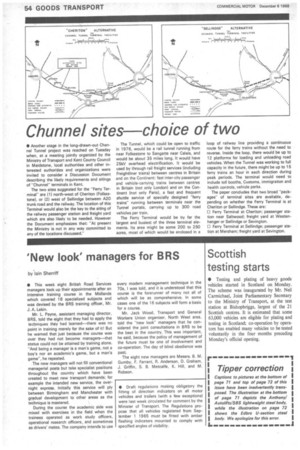'New look' managers for BRS
Page 56

If you've noticed an error in this article please click here to report it so we can fix it.
by lain Sherriff • This week eight British Road Services managers took up their appointments after an intensive training course in the Midlands which covered 16 specialized subjects and was devised by the BRS training officer, Mr. J. A. Lakin.
Mr. L. Payne, assistant managing director, BRS, told the eight that they had to apply the techniques they had learned—there was no point in training merely for the sake of it! But he warned that just because the course was over they had not become managers—that status could not be attained by training alone. "And being a manager is a man's game, not a boy's nor an academic's game, but a man's game-, he repeated.
The new managers will not fill conventional managerial posts but take specialist positions throughout the country which have been created to meet new transport demands; for example the intended new service, the overnight express. Initially this service will ply between Birmingham and Manchester with gradual development to other areas as the technique is mastered.
During the course the academic side was mixed with exercises in the field when the trainees operated as work study officers, operational research officers, and sometimes as drivers' mates. The company intends to use every modern management technique in the 70s, I was told, and it is understood that this course is the forerunner of many not all of which will be as comprehensive. In some cases one of the 16 subjects will form a basis for a course.
Mr. Jack Wood, Transport and General Workers Union organizer, North West area, told the "new look" managers that he considered the joint consultations in BRS to be the best in the country. This was important, he said, because the policy of management of the future must be one of involvement and co-operation. The day of blind obedience was past.
The eight new managers are Messrs. B. M. Gumby, F. Farrant, R. Anderson, D. Graham, J. Griffin, S. B. Metcalfe, K. Hill, and M. Robson.








































































































































































